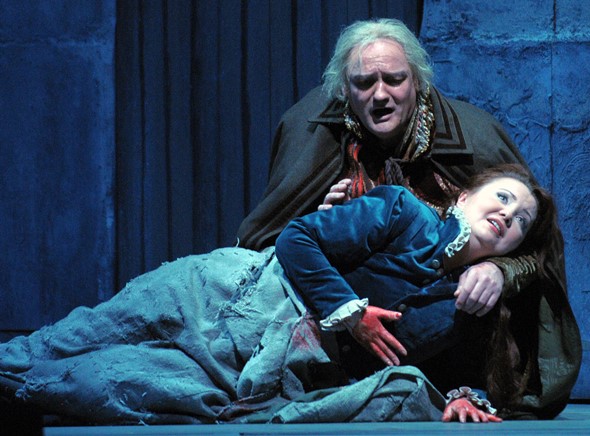Lyric Opera’s throwback ‘Rigoletto’ is rescued by stellar debuts of Dobber, Shagimuratova
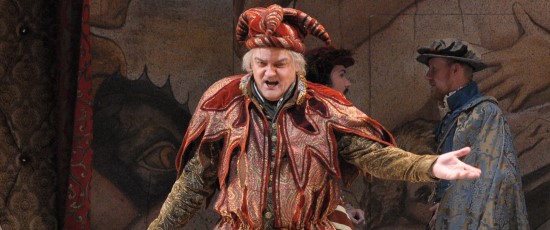 Review: “Rigloletto” by Giuseppe Verdi, at the Lyric Opera of Chicago through March 30 ★★★
Review: “Rigloletto” by Giuseppe Verdi, at the Lyric Opera of Chicago through March 30 ★★★
By Lawrence B. Johnson
Verdi’s “Rigoletto” is about a man’s tormented soul, and about his sheltered daughter, a young woman utterly innocent of the world – and the inexorable calamity that befalls them both. In all that, in the voices of baritone Andrzej Dobber and soprano Albina Shagimuratova and their moving rapport as protective father and enraptured daughter, the Lyric Opera of Chicago offers a “Rigoletto” deeply rewarding at its heart.
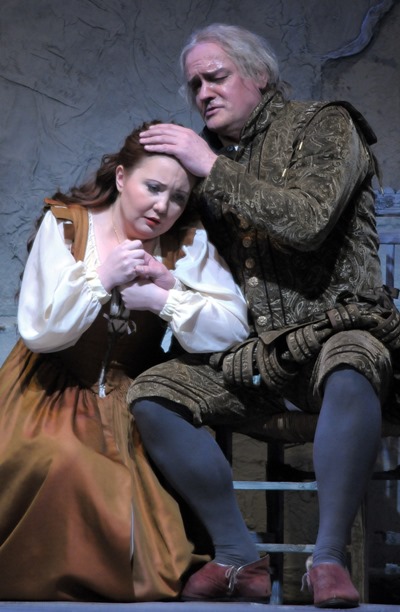 Draw the circle larger, however, and the problems with this production become evident, starting surely with a look that evokes not so much the word traditional as the word quaint. This show could have been mounted in the Lyric’s Mary Garden era. In its sets, costumes and general aura, it smacks of 1925. Even the pervasive muted hues contribute to a sense of something old and worn.
Draw the circle larger, however, and the problems with this production become evident, starting surely with a look that evokes not so much the word traditional as the word quaint. This show could have been mounted in the Lyric’s Mary Garden era. In its sets, costumes and general aura, it smacks of 1925. Even the pervasive muted hues contribute to a sense of something old and worn.
Nor is the enterprise helped by director Stephen Barlow’s static staging. That the unfolding tragedy catches the viewer in its sweep is thanks largely to the natural pull of Dobber’s presence as actor as well as singer. The Polish baritone inhabits Rigoletto’s form and misery, this court mischief-maker whose spitefulness comes back to haunt him, as if born to both. Vocally, he is a full-range artist who conjures the jester’s dark self-consciousness – in comparing himself to the assassin Sparafucile (“Pari siamo”) – as convincingly as he begs for compassion from the courtiers who have taken his daughter (“Cortigiani, vil razza dannata”).
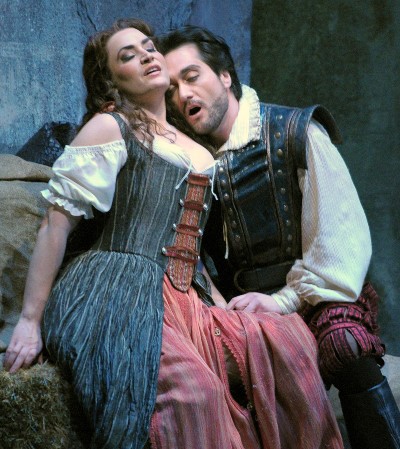 Like Andrzej Dobber, soprano Albina Shagimuratova is making her Lyric debut, and the Russian singer is no less impressive. She brings to Gilda’s youthful effervescence a silvery brilliance and freshness that belies the sheer grandeur of her vocal instrument. Shagimuratova’s delicate, sparkling turn through “Caro nome” – the deceived girl’s airy musing on the phony name the Duke has given her — stopped the show with its effortlessly soaring finish. The duet by the ravished Gilda and her devastated father cast these two splendid voices in a union of heartbreaking beauty.
Like Andrzej Dobber, soprano Albina Shagimuratova is making her Lyric debut, and the Russian singer is no less impressive. She brings to Gilda’s youthful effervescence a silvery brilliance and freshness that belies the sheer grandeur of her vocal instrument. Shagimuratova’s delicate, sparkling turn through “Caro nome” – the deceived girl’s airy musing on the phony name the Duke has given her — stopped the show with its effortlessly soaring finish. The duet by the ravished Gilda and her devastated father cast these two splendid voices in a union of heartbreaking beauty.
As the dastardly Duke, tenor Giuseppe Filianoti sings the showcase arias “Questa o quella’ and “La donna è mobile” with a crisp vitality and a ringing top that transcends the director’s concept of the conflicted reprobate. One could argue that the Duke is just what he appears to be, a narcissisitic brat who never grew up because he never needed to. He has his darkly reflective moment, when he fancies he could be content with this poor, simple girl Gilda, then turns on the lights again to behold his limitless wealth, seemingly limitless youth and ample amorous options.
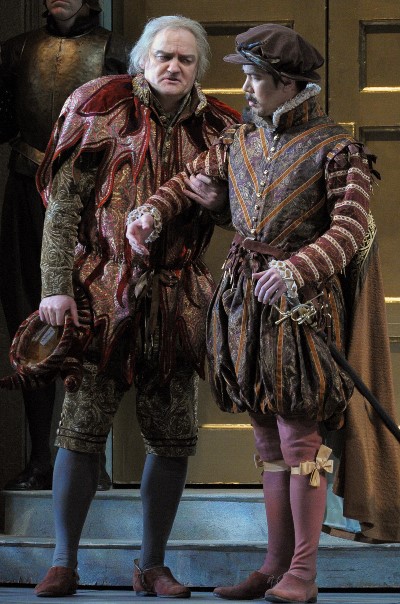 Speaking of which, mezzo-soprano Nicole Piccolomini cuts a comely figure as Maddalena, the lure used by her assassin brother Sparafucile to facilitate his sharp-edged business. Piccolomini’s sultry, well-contoured singing helped to make a resonant success of the great quartet “Bella figlia dell’amore” with Shagimuratova, Dobber and Filianoti.
Speaking of which, mezzo-soprano Nicole Piccolomini cuts a comely figure as Maddalena, the lure used by her assassin brother Sparafucile to facilitate his sharp-edged business. Piccolomini’s sultry, well-contoured singing helped to make a resonant success of the great quartet “Bella figlia dell’amore” with Shagimuratova, Dobber and Filianoti.
The odd man out among the principal singers, at least on opening night, was bass Andrea Silvestrelli, whose Sparafucile suffered from a rather diffuse sound through the middle and bottom registers – the assassin’s money notes. A somewhat wooden staging of the crucial first encounter between Rigoletto and the assassin-for-hire, in the shadows of the jester’s anguished night, did not help Silvestrelli draw Sparafucile as a seriously dangerous, cold-blooded killer.
Perhaps it’s a combination of pallid sets and bleak lighting, but the Duke’s palace suggests he has fallen on hard times. Problematic as well is Barlow’s direction of the courtiers, the Lyric Opera Chorus, who sing with a conviction missing from their occupation as actors. Lastly, the musical direction provided by American conductor Evan Rogister, also in his Lyric Opera debut, is adequate though often tentative. We shall have another look at him later this season when he returns to conduct the Lyric production of Andre Previn’s “A Streetcar Named Desire.”
Note: Dobber will appear only through March 10. Starting with the March 14 performance and continuing through the end of the run March 30, the role of Rigoletto will sung by Serbian baritone Željko Lučić. Shagimuratova is scheduled to sing all performances.
Related Links:
- Performance location, dates and times: Details at LyricOpera.org
- Preview of Lyric Opera’s complete 2012-13 season: Read it at ChicagoOntheAisle.com
Photo captions and credits: Home page and top: Andrzej Dobber as the mean-spirited court jester Rigoletto. Descending: Rigoletto (Andrzej Dobber) is desperately protective of his daughter Gilda (Albina Shagimuratova). Maddalena (Nicole Piccolomini) sets up the carousing Duke (Giuseppe Filianoti) for her brother’s lethal work. Rigoletto (Andrzej Dobber) implores the courtier Marullo (Joseph Lim) to tell him where Gilda is being held. Below: Gilda (Albina Shagimuratova), who has exchanged her life for the Duke’s, dies in the arms of her father Rigoletto (Andrzej Dobber). Photos by Dan Rest.
Tags: Albina Shagimuratova, Andrea Silvestrelli, Andrzej Dobber, Evan Rogister, Giuseppe Filianoti, Nicole Piccolomini, Stephen Barlow

